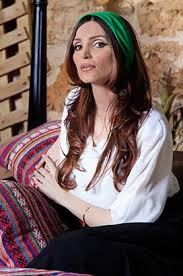SIDI BEN YOUSSEF CULTURAL COMPLEX – 20h00 - Lamar – Arab Songs from Palestine
Lamar, whose real name is Rula Hasna, is one of those young singers who retains the celebrated, deep sensibility of the tarab, a long way from the antiseptic quality put out by Arab television channels.
Lamar is originally from Acre, an historic walled port-city with continuous settlement from the Phoenician period. The remains of the Crusader town, dating from 1104 to 1291, lie almost intact, both above and below today's street level, providing an exceptional picture of the layout and structures of the capital of the medieval Crusader kingdom of Jerusalem.
With her husband Mahran Moreb, who is a master qanun (dulcimer) player and composer, she concentrates on a repertoire that conjures up the atmosphere found at the musical salons of the sultans of old.
As in the piece Fi A’ainaika O’unwani, Lamar illustrates historic poetry – that of the ancient poets of Palestine and the Arab world during the Renaissance (the Nahda) – right up to Oum Keltoum, who had a true melodic background.
Listening to Lamar, one recalls the compositions of Zakaria Ahmed, Farid al-Atrash and Mohammed Al Qasabji accompanying the diva on the lute, impenetrable behind her dark glasses.
PREFECTURE HALL – 21h30 - Farida Muhammad Ali – The voice of Maqâm – Iraq
The term maqâm (literally a location or place) refers to a type of music possessed of a particular mood or feeling. In the classical music tradition of Iraq, it means simply a song which masterfully develops a wide range of emotions through its 23 modes. After a short instrumental prelude known as the muqadimma, the art of the qârî (singer or reciter) consists of delivering some rich verses in the tradition of the qasida, a type of Arab poetry that continues to inspire many contemporary poets.
Although it was only towards the end of the 18th century that current Iraqi maqâm was defined, the style recalls the sumptuous epoch of the Abbassids of the 8-13th centuries. Lying at the heart of the ancient land of Mesopotamia, Baghdad – the country between the two rivers, the Tigris and the Euphrates – was home to a universal Islam within the confines of the Arab world, both Turkish and Persian. This is still seen in the tchâlghî baghdâdi ensembles.
These ensembles are principally characterised by their use of the santûr, a hammered dulcimer similar to that used in Persian tradition, and the djôza (the name of the soundbox made of coconuts, djôz al-hind, or ‘Indian nut’), a four-stringed fiddle which is today replaced less than satisfactorily with a western violin. These two instruments of great acoustic delicacy give the Iraqi tradition an enigmatic perfume of the far-off Orient.
Farida Mohammad Ali was born in Kerbela, a legendary Shi’a village in southern Iraq, where the tradition of women singers was permitted. Accompanied by her tchâlghî baghdâdi ensemble, she expresses the refinement of the ancient courts as well as a rich popular repertoire.
DAR ADIYEL – 23h00 - Ariana Vafadari – Gathas: Zoroastrian Song – Iran & France
Ariana Vafadari brings to life texts that date back more than 3700 years. She sings in the ancient Iranian Gathic language in which these Hymns of Zarathustra were written. They are the prayers of Zoroastrianism, a monotheistic religion of ancient Persia, still practised today by the Parsi community principally living in Iran and India.
The ancient Persians received this religion from Zoroaster or Zarathustra who was born around 660 BCE in Bactria (now Afghanistan) and was a contemporary of Pericles, Buddha and Confucius. In the holy book Avesta, the prophet describes the battle between the Kingdoms of Light and Darkness (Ahriman). The supreme being Ahura-Mazda created Mithra, god of the sun, moon and stars. Fire is the son of Ahura-Mazda; this is the reason why the ancient Persians who followed Zarathustra and Mazdeism, also known as Zoroastrianism, never extinguished sacred fires.
Thanks to Helen Ranger for translations from the French
Nights in The Medina 3
May 11
Book your ticket here
The View From Fez is a Fez Festival official Media Partner
FULL FESTIVAL PROGRAMME HERE
The View From Fez is a Fez Festival official Media Partner
FULL FESTIVAL PROGRAMME HERE
See our Fes Festival previews:
Opening Night Preview
Homage to India Preview
Divas of the World Preview
Nights in the Medina 1 Preview
Nights in the Medina 2 Preview
Nights in the Medina 3 Preview
Istanbul to Fez Preview
Tribute to Oum Keltoum Preview
Samira Saïd Preview
Forum Sessions Preview
Sufi Nights & Boujloud Concerts
SHARE THIS!





No comments:
Post a Comment